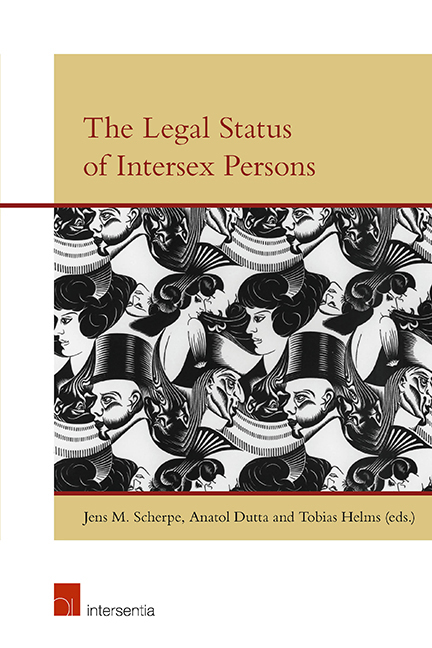Book contents
- Frontmatter
- Preface
- Contents
- List of Contributors
- The Legal Status of Intersex Persons: An Introduction
- Malta Declaration
- Darlington Statement
- Vienna Statement
- PART I MEDICINE AND PSYCHOLOGY
- PART II THEOLOGY AND LEGAL HISTORY
- PART III TRANSGENDER, TRANSSEXUALITY AND INTERSEX
- PART IV NATIONAL LEGAL DEVELOPMENTS
- PART V PRIVATE INTERNATIONAL LAW ASPECTS OF INTERSEX
- PART VI INTERSEX AND HUMAN RIGHTS
- Standing Up for the Human Rights of Intersex People
- The ‘Normalisation’ of Intersex Bodies and ‘Othering’ of Intersex Identities
Intersex Children and the UN Convention on the Rights of the Child
from PART VI - INTERSEX AND HUMAN RIGHTS
Published online by Cambridge University Press: 31 January 2019
- Frontmatter
- Preface
- Contents
- List of Contributors
- The Legal Status of Intersex Persons: An Introduction
- Malta Declaration
- Darlington Statement
- Vienna Statement
- PART I MEDICINE AND PSYCHOLOGY
- PART II THEOLOGY AND LEGAL HISTORY
- PART III TRANSGENDER, TRANSSEXUALITY AND INTERSEX
- PART IV NATIONAL LEGAL DEVELOPMENTS
- PART V PRIVATE INTERNATIONAL LAW ASPECTS OF INTERSEX
- PART VI INTERSEX AND HUMAN RIGHTS
- Standing Up for the Human Rights of Intersex People
- The ‘Normalisation’ of Intersex Bodies and ‘Othering’ of Intersex Identities
Summary
INTRODUCTION
The term ‘intersex children’ is often used as a short term for children born with ambiguous sex characteristics, or put differently, diagnosed as having special medical conditions associated with differences in sex development. In fact there are a number of varieties, but the common feature is that it is difficult to determine whether the child is a girl or a boy. A major question is whether the child should be assigned a sex at birth or in early infancy and go through surgery and other forms of treatment to obtain that sex. For decades such medical interventions have been performed in the belief that they were necessary. However, doubt has been cast on whether it is possible to successfully assign a gender to an infant. Not only is it questionable whether the treatment is beneficial to the person concerned, but it has also gradually become known that the treatment in many instances has had various harmful effects on the children (and later adults) concerned, both physically and mentally. Consequently, over the last 10 to 15 years increasing attention has been paid to the person's human rights in this regard.
Children have rights under the UN Convention on the Rights of the Child (CRC) as well as under all other human rights conventions. This chapter mainly deals with the CRC, which focuses specifically on children and whose provisions are adapted to their special situation and needs, but other conventions will be mentioned where they are relevant. The chapter seeks to interpret and apply the CRC in the context of intersex children, in order to answer the question of whether a child may and should be assigned a sex in the early stages of life. The aim is also to outline the more specific obligations of the state under the Convention in this respect.
Almost all states in the world have ratified the CRC, making it a globally recognised instrument. The implementation of the CRC in the various countries is monitored by the UN Committee on the Rights of the Child, which is a body comprised of 18 members from around the world, so-called independent experts.
- Type
- Chapter
- Information
- The Legal Status of Intersex Persons , pp. 515 - 535Publisher: IntersentiaPrint publication year: 2018
- 2
- Cited by

